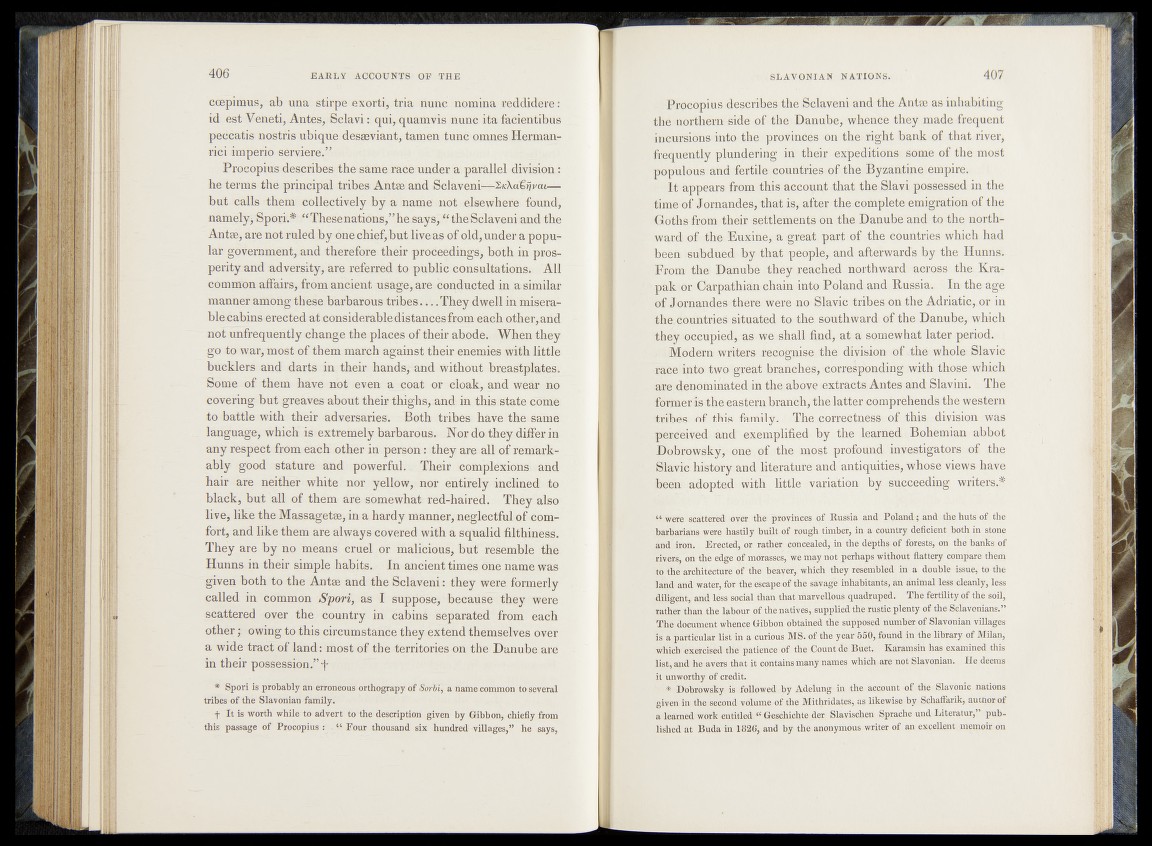
coepimus, ab qna stirpe exorti, tria nunc nomina reddidere:
id est Veneti, Antes, Sclavi: qui, quamvis nunc ita facientibus
peccatis nostras ubique desmviant, tarnen tunc omn.es Herman-
rici imperio séraeaF^ * s
Procopius describes the same race under a parallel division:
he terms the principal tribes Antae and Sclaveni—SfcXaCijmi—
but calls them collectively by a name not elsewhere found,
namely* Spori.* “ Thesenations/’hasays, “ the Sclaveni and the
Antae, are not ruled by one chief* but live as of old, under a popuf
lar government, and therefore their proceedings, both in prosperity
and adversity, are referred to public consultations;- All
common affairs,-from ancient usage, are conducted in',a similar
manner among these barbarous trabes. ;^i^hey.dwel-ininisera-
blecabins erected at considerable distances from each other, and
not unffequently change the places of their abode. When they
go to war, most of them inarch against their enemies with little
bucklers and darts in their hands,1 and without breastplates.
Some of them have not even a coat or cloak, and wean no
covering but greaves about their thighs,.and in this state come
to battle with their adversaries. Both tribes have the same
language, which is extremely barbarous. Nor do they differ in
any respect from each other in person : they are all of remarkably
good stature and powerful. . Their complêxions> and
hair are neither white nor yellow, nor entirely inclined to
black, but all of them are somewhat red-haired. They also
live, like the Massagetae, in a hardy manner, neglectful of comfort,
and like them are always covered with a squalid filthiness.
They are by no means cruel or malicious, but resemble the
Ilunns in their simple habits. In ancient times one name was
given both to the Antae and the Sclaveni: they were formerly
called in common Spori, as I suppose, because they were
scattered over the country in cabins separated from each
other | owing to this circumstance they extend themselves over
a wide tract of land: most of the territories on the Danube are
in their possession.” f
* Spori is probably an erroneous orthograpy of S o rU \ a name common to several
tribes of the Slavonian family."
t I t is worth while to advert to the description given by Gibbon, chiefly from
this passage of Procopius : • Four thousand six hundred-villages,” he says,
ProGopius describes;the .^claveni and-the Antae as inhabiting
the.mortherate&i,de ofothèiDanube, whence they made frequent
•inteursions-into the provn|0ós;an4he^ight bank of that river,
frequently plundering in their expeditionsy;Some of the most
pophicu-s -and ferti-l^ounfrajCSioftthe Byzantine empire.
4$ltiappears fifm^his acco^ntxthatethe Slavi possessed in the
time of -Jomandcs,,'that;is>ja|tej:4he complete emigration of the
kSoths-from -their settlement§bn the Danube and .to the north-
ward-öf the Euxihe/R gd|e4tvpartiof>the epunfri.es which had
ibeën, euMuedfe^y+dhat -people, .and afterwards .by the Hunnsi.
$?rom therDanubé,tbèyif,e{iGhed northward^pcjpss the. Kra-
pak or:Carpathian cbaintnto Poland and Russifi*»; In-thaage
of.Jer^a-nd^s4"hefe'%eïr,#^n>)Slavic >'teibes on tlje. Adriatic,, or in
tb&c’ountriesf-sistCial|edtCrthe southward of the Danube^.which
thcyioGcupied yRs > w e ;shall find* at a somewhat'later-period. •;
fcijilcdern writers j^cognis'»s^iei division ^F|the.whole Slavic
race in;t®>tw^great*bpaH©heöVieoïre^pöndihpwith, those .which
-are denotoinated in thq,afeoye iextracts Antesyanct Slavini. : (The
former is theeaste^bianch/the latter. Gomprehendsfhe^estern
tribes • of this family. ! ^The^cpraecfiiés^ef this, division was
perceived and?-» exemplified - byj’t^Öilearned ? Bohemian abbot
Dobrowsky, one-.of . the^most profound p ^ ^ g a tQ r s ,of the
.Slavic history and literature and'antiquifies^wh^^^ews have
been ^adapted with little v a ria tio n byisücceeding writers*
4*:*were scattered over the provinces of .Russia and Poland; and the huts of, the
barbarians were hastily built^<j| rough timber, in a country-deficient both in stone
and iron. Erected, or rather concealed,- in the depths'of forests, on the hanks of
’rivers, on die edge of mOTasses/we may not perhaps without flattery compare them
to Ihe architecture of the beaYer/^hmh; they resembled id 'a dbutileliitfe,' to the
land and water, for £he escape of thfe savage inhabitants, dn animal less cleanly, less
diligent, and léés social than that ’marveljous quadruped, ^he fertility of the soil,
rather than the labour of the natives, supplied the rustic plenty of the Sclavonians.’’
The document whence Gibfeon obtained the supposed number of Slavonian villages
is a particular list in a curious MS. of the year 5 5 $ found' in the library of Milan,
which exercised thW patience of the Count de Buet. j Kaiamsin has éxamined this
list, amd he »vers that it contains many names which are not .Slavonian. He deem*
it unworthy of credit.
* Dobrowsky is followed -by Adelung- in the account of-the Slav&nic nations
given in the second volume of the Mitlpddates, as likewise by Schaffarik, autnor of
a learned work entitled {< GesChichte der Slavischen -Sprache und’ Eiteratur, published
at Buda in 1826, and by the anonymous writer of an excellent memoir on